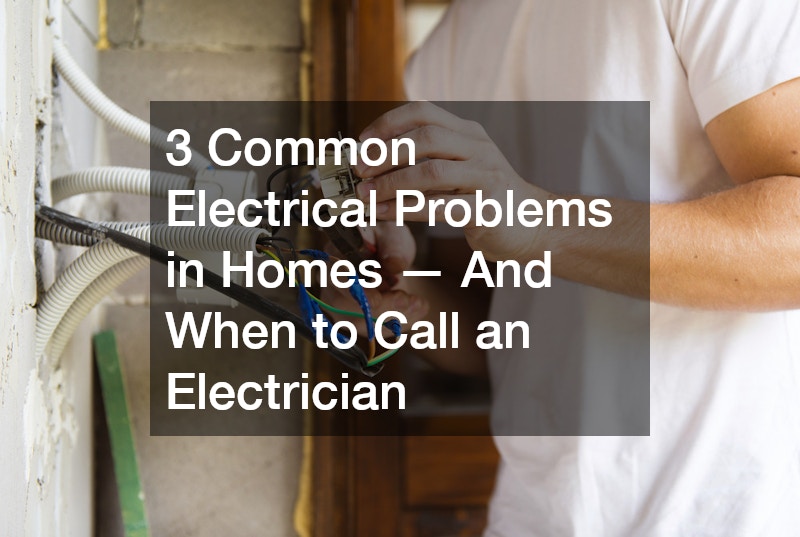3 Common Electrical Problems in Homes — And When to Call an Electrician

Electricity plays a central role in modern living. From lighting and appliances to entertainment and heating systems, a consistent power supply is essential to a comfortable and functional home. However, even the most well-maintained properties can experience electrical problems over time. Understanding which issues are minor and which require professional attention can help you stay safe and avoid more costly damage down the track. Here are three of the most common electrical problems found in Australian homes — and when it’s time to call an electrician.
Flickering or Dimming Lights
Flickering or dimming lights can seem like a small nuisance, but they often point to a deeper electrical issue. Many homeowners assume the problem is limited to a single lightbulb or fixture, but if the issue occurs frequently or affects multiple rooms, it could indicate a poor connection in your wiring or an overloaded circuit.
Loose wiring is not only inefficient — it can also be dangerous. If ignored, it may lead to short circuits, arcing or even house fires. In some cases, fluctuating voltage from the power grid can also cause light instability, especially in areas with outdated infrastructure. If you’re noticing lights dim when you use certain appliances — such as the air conditioner or microwave — this is a clear sign the circuit may be overloaded.
Power Outlets That Feel Warm or Don’t Work
Another common electrical issue in homes is faulty power outlets. If a power point feels warm to the touch, makes a buzzing sound or has stopped working entirely, it may be a sign of deteriorating wiring or internal damage. In older homes, some outlets may not be rated to handle the energy load of modern appliances, causing them to overheat or short out.
Sometimes, a tripped safety switch or circuit breaker can be the culprit. This might be due to too many high-demand devices drawing power at the same time, such as kitchen appliances, heaters and entertainment systems. However, if an outlet repeatedly fails or trips the power, it likely means the problem is beyond a simple overload.
Ignoring faulty outlets is not worth the risk. A warm or discoloured power point may be an early sign of an electrical fire waiting to happen. These issues can also damage your appliances or cause injury. A licensed electrician should inspect any outlet that behaves unusually. They’ll be able to test the connection, check for signs of arcing or overheating and replace the outlet if necessary.
Circuit Breakers That Trip Frequently
Your home’s circuit breakers and safety switches are designed to protect the property from electrical faults. When they trip, it means they’re doing their job — cutting power to prevent overloads, short circuits or ground faults. However, if you find yourself resetting the same breaker repeatedly, there’s a good chance your home’s electrical system needs professional attention.
Frequent tripping is often caused by appliances drawing more current than the circuit can handle. For example, running a heater, dryer and dishwasher all on the same line can exceed capacity and cause the breaker to trip. In some cases, the issue could be with a single faulty appliance — one that has an internal short or is leaking current.
Outdated switchboards are another common factor. Many older homes still rely on fuse boxes or circuit boards that weren’t designed to handle today’s energy demands. As a result, these systems become overloaded far more easily, leading to more frequent shutdowns and a greater risk of fire.
When to Call a Professional
While some electrical issues can seem minor, the consequences of ignoring them can be severe. Fires, electric shocks and property damage are all possible outcomes of faulty wiring or overloaded circuits. That’s why any persistent problem — whether it’s flickering lights, a warm outlet or a circuit that keeps tripping — should be examined by a qualified electrician.
By addressing issues early, you can avoid more costly repairs and ensure your family stays safe. Electrical systems are one area of the home where shortcuts and guesswork should never be an option. Whether your home is newly built or decades old, routine inspections and timely repairs by a licensed professional offer peace of mind and long-term reliability.
Electrical problems are more than just an inconvenience — they’re a risk to your property and safety. From flickering lights to faulty outlets and circuit breakers that keep tripping, recognising the signs early can prevent bigger issues in future. Always call a licensed professional when in doubt. It’s the safest and most reliable way to protect your home and the people in it.
.



